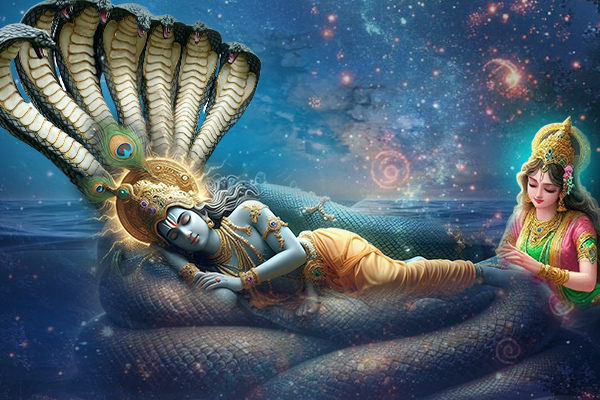
Devutthana Ekadashi is one of the important Ekadashi, out of the 24 Ekadashis, as it is believed that on this Ekadashi Tithi (date), Bhagwan Vishnu, the protector, and preserver of the Earth and Universe, wakes up after the Chaturmas (4 months) of being in a sleep state. As per the ancient Hindu texts, Bhagwan Vishnu is said to go to sleep on the Devshayani Ekadashi Tithi (June-July) and stays in that state for the period of Chaturmas/four months. During these four months, auspicious events like engagements, weddings, etc. should not take place.
On Devutthana Ekadashi, when the Supreme Bhagwan wakes up, it marks the commencement of the wedding season and all auspiciousness. The term Devutthana (from Devutthana Ekadashi) literally means God waking, 'Dev ko uthana (wake up the Bhagwan)'. Therefore, a part of the rituals followed on Devutthana Ekadashi is to chant mantras especially meant for gently awakening Bhagwan Vishnu. Devutthana Ekadashi is also called Prabodhini Ekadashi, Vishnu-Prabodhini Ekadashi, Haribodhini Ekadashi, and other names in the different parts of India. The Vaishnava sect are ardent followers of Devutthana Ekadashi and all other Ekadashis, as the prime and only Supreme God for them is Bhagwan Vishnu.
Keeping fast through the Devutthana Ekadashi day till the next morning, remembering and worshipping Bhagwan Vishnu/Shri Krishna on Devutthana Ekadashi has many benevolent outcomes, including fulfilling desires. You may keep a dry fast which is the most meritorious or else you can drink water but abstain from food on Devutthana Ekadashi. People who have any health problems can have a fruit-based diet, but no grains, lentils, or beans are to be consumed on Devutthana Ekadashi.
When is the Devutthana Ekadashi 2026? Muhurat and Parana Time
Devutthana Ekadashi falls every year, on the 11th day of the waxing Moon phase or Shukla Paksha, of the Hindu month of Kartik (October-November). Devutthana Ekadashi is observed and celebrated by Hindus all over India and World.
Devutthana Ekadashi on
Friday, November 20, 2026
On 21 st Nov, Parana Time - 07:20 AM to 09:13 AM
On Parana Day Dwadashi End Moment - 06:26 PM
Ekadashi Tithi Begins - 08:45 PM on Nov 19, 2026
Ekadashi Tithi Ends - 08:01 PM on Nov 20, 2026
(Parana means breaking the fast and it should not be done during Hari Vasara)
Those who observe Devutthana Ekadashi fast must break it after sunrise the next day of Ekadashi. Another important consideration is that one must not break the Devutthana Ekadashi fast during Hari Vasara which is the fourth duration of Dwadashi. The best time to break the fast is pratah kala (morning).
Benefits/Significance of Devutthana Ekadashi Vrat -Importance of Devutthana Ekadashi
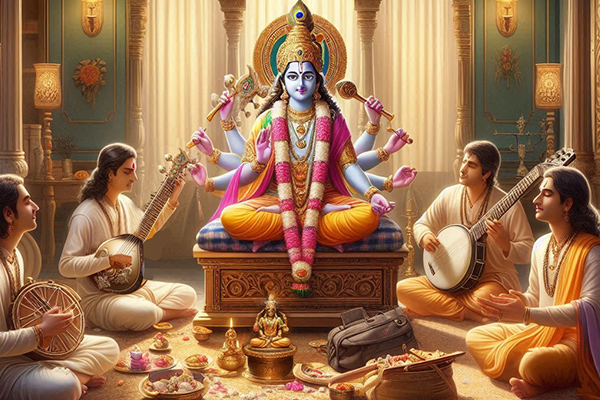
Devutthana Ekadashi sadhaks/devotees observe a vrat or fast from the early morning of the Devutthana Ekadashi day to the next morning. One of the most important vrat vidhi or rules is to keep awake throughout the night, singing bhajans and chanting. Observing fast on Devutthana Ekadashi and every Ekadashi is considered highly meritorious. Bhagwan Brahma had said to Narad Muni about the importance of observing Devutthana Ekadashi Vrat and Puja on the day of Devutthana Ekadashi; said that observing fast on this day is holier than a bath in the pure river Ganga, and even the Aswamedha sacrifices pale in their merits compared to Devutthana Ekadashi. So potent is the Devutthana Ekadashi that merely by hearing about the stories related to Devutthana Ekadashi, an individual's sins are eliminated.
Devutthana Ekadashi is also the day of Tulsi Vivah, which is a major significance of this pious Ekadashi day. The Tulsi plant is worshipped on this day, and rituals of getting a Tulsi plant married to the sacred Shaligram stone, Bhagwan Vishnu's representation
Sadhak/devotees who keep a 24-hour long fast on the day of Prabodhini Ekadashi or Devutthani Ekadashi, follow all the Devutthani Ekadashi Vrat Vidhi perfectly, will benefit by being liberated from the sins of 7 past lives, by Bhagwan Vishnu's grace
Observing fast and conducting puja on Devutthana Ekadashi helps the devotee/sadhaks in many ways; by Bhagwan Vishnu’s grace, the sadhaks/devotees are blessed with good health, protection, prosperity, success, growth, harmony in relationships, and all-around well-being
A person who is the worst of sinners has committed the most heinous of crimes; if he/she ever observes the Devutthana Ekadashi Vrat, then that individual's sins are going to be washed away
Devutthani Ekadashi is significant for the sadhak/devotee in getting liberation from the cycle of birth and death, thereby attending Moksha, by the grace of Bhagwan Vishnu /Hari.
DEVUTTHANA EKADASHI PUJA VIDHI: DEVUTTHANA EKADASHI PUJA AT HOME
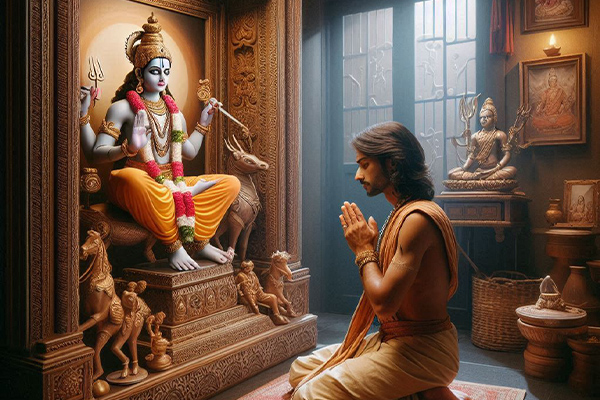
Devutthana Ekadashi Puja Vidhi is different from the other Ekadashi Puja Vidhi as this involves devoutly waking up the Supreme Bhagwan Vishnu after His four-month-long sleeping phase. The Devutthana Ekadashi Puja Vidhi described below is commonly followed.
After having a bath and wearing fresh clothes very early in the morning, invoke Bhagwan Vishnu and take the Sankalpa to keep the fast.
On Devutthana Ekadashi, Bhagwan Vishnu and His consort, Goddess Lakshmi are worshipped. Generally, outside the house, a picture is drawn with the help of Geroo powder or Gairika powder and lime mixed in water for a thick liquid to serve as paint.
The picture comprises symbolic figures of Bhagwan Vishnu and Maa Lakshmi, symbols of Bhagwan Vishnu elements like the Sudarshan Chakra, Shankha, Lotus/Padma, Gada, feet of Bhagwan Vishnu, and Goddess Lakshmi. Tulsi plant, Amla plant, a ladder, feet of GauMata or Cow, etc are drawn. The picture is to be drawn in a square or rectangle border, with a gap in the direction facing your door.
Draw the feet of Bhagwan Vishnu and Maa Lakshmi leading to your house. Inside the house to the feet drawing should be directed to rooms except for the toilet and bathroom
Now keep offerings like seasonal vegetables and fruit, sugarcane, jujubes, sweet potatoes, etc. on a plate to the Bhagwan Vishnu picture you have drawn.
Yellow Flowers are offered to Bhagwan Vishnu.Bhagwan Vishnu's favourite tulsi leaves, and sandalwood paste is a must.
The worship/Puja is done in the evening following the Puja Vidhi, Chanting of Mantras, etc. Lighting ghee lamp, camphor, incense
Various Mantras to wake up Bhagwan Vishnu and request Him to take charge of the World once more are chanted, accompanied by the blowing of Shankh or conch shell, ringing bells, etc.
Devutthana Ekadashi Mantra
Mantra for waking Bhagwan Vishnu -
‘उत्तिष्ठो उत्तिष्ठ गोविंदो, उत्तिष्ठो गरुड़ध्वज।
उत्तिष्ठो कमलाकांत, जगताम मंगलम कुरु।।
Meaning:
'Arise, arise, O Govinda, abandon your slumber, O Bhagwan of the universe. When you are asleep, O Bhagwan of the world, the entire universe also remains asleep. But when you are awake, everything becomes active. So, arise, arise, O Madhava!'
Staying awake at night on Devutthaai Ekadashi makes the fast/vrat successful.
The next morning before breaking the fast, donate food, clothes, money, and a pot of water to Brahmins and the needy
As it is also the day of Tulsi Vivah, Tulsi Plant at home is also decorated with yellow cloth, Garlands, and flowers as the Tulsi Vivah takes place in the evening
Diyas or Oil Lamps are lit outside the house to indicate the festive mood and usher auspiciousness into the house.
DEVUTTHANA EKADASHI VRAT KATHA/STORY
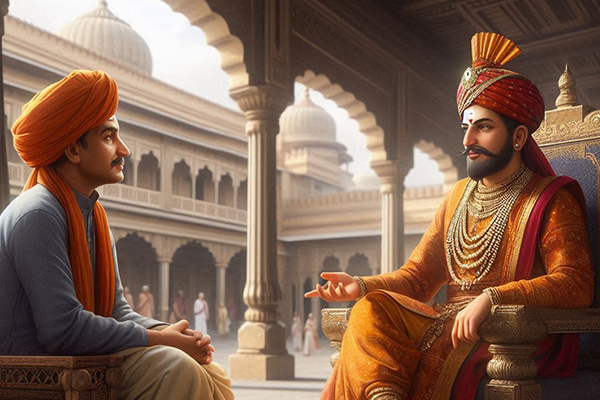
The Devutthana Ekadashi Vrat is considered complete only when the narration of Devutthana Ekadashi Vrat (fast) Katha is heard or read on the day of Devutthana Ekadashi, before breaking the fast.
The Devutthana Ekadashi Vrat Katha is about a King who was a devotee of Bhagwan Vishnu and observed all the Ekadashi fasts religiously. Not only that, but his whole kingdom also used to observe Ekadashi Vrat with deep devotion. Once a man from another kingdom came to the kingdom and requested the King to give him a job and let him stay in the Kingdom. The King agreed to do so but put forward the condition of not eating food on Ekadashi, that is like the rest of the citizens of his kingdom, the man would have to follow the fast. The stranger agreed to the terms, not giving it too much thought.
On the arrival of Ekadashi, the man went to the King and told him that he would not be able to survive without eating anything for him. When the King reminded him of the terms of Ekadashi fast, the man said that he would then have to die if there was no food, he would not be able to survive the day. When efforts failed to make him understand, the Kind gave him flour, etc. for him to eat.
Once the ingredients were received, the man went by the riverside, had his bath, and prepared food. Then sitting on the riverbank, he invoked Bhagwan Vishnu to come and have the food first. Hearing his invocation, Bhagwan Vishnu appeared and had what was offered. The man too had food and carried on with the rest of the day.
The Devutthana Ekadashi Katha is about what happens after fifteen days. On Ekadashi, the man went to the King again, this time asking for double the amount of food. The King was surprised at this demand and asked him why. The man replied saying that Bhagwan Vishnu had food with him, and it is not sufficient for the two of them. The King refused to believe the story and told him that he meticulously observed the Ekadashi fasts for years and prayed regularly to Bhagwan Vishnu but how is it possible that the Bhagwan never appeared to him and instead appeared to someone who does not even keep a fast on Ekadashi?
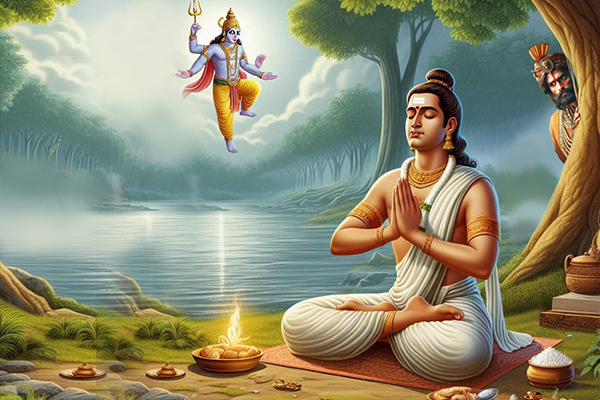
Understanding that the King was not believing his story, the man invited the King to see for himself. The King went along with the man and sat hidden behind a tree. As before, the man prepared the food and invoked Bhagwan Vishnu to appear and have food. But the Bhagwan did not appear. On repeated invocation, when the Bhagwan did not appear, the man told Bhagwan Vishnu that if He did not appear to share the food then he would give his life by drowning in the water of the river. But again, there was no desired response. The man feeling let down by Bhagwan Vishnu proceeded to drown himself in the water of the river. At the end moment, seeing the resolute intention of the man, Bhagwan Vishnu appeared in His Divine glory and shared the food with the man, and after that Bhagwan Vishnu took the man along with Him to Baikunth, the abode of Bhagwan Vishnu.
Witnessing this unbelievable incident, the King understood that only fasting for Ekadashi does not help to experience Bhagwan Vishnu. It requires a pure heart and clear intentions. From that time onwards, the King started observing the Ekadashi fasts with full dedication, purity of mind, and intention.
Devutthana Ekadashi Vrat Vidhi
Devutthana Ekadashi Vrat starts on the morning of Ekadashi and the Sankalp(intension) of observing the Vrat(fast) should be taken after having bath early in the morning.
The devotee should specify whether he/she is keeping partial or complete Vrat/fast.
Invoke and worship Bhagwan Vishnu.
The best fasting is dry fasting, Nirjala Vrat, which means, fasting without drinking water and food. One can observe partial fast by drinking water and abstaining from food.
However, devotees should be aware of what their body and health and fast accordingly. Fruit and Milk diet is also a common way to observe fast on this day.
Beans and grains are prohibited to eat on Ekadashi for devotees who are fasting by eating one meal on Ekadashi. Non vegetarian food, onion, garlic is strictly not allowed on Ekadashi and Dwadashi.
Benefits/Significance of Devutthana Ekadashi Vrat -Importance of Devutthana Ekadashi
Devutthana Ekadashi sadhaks/devotees observe a vrat or fast from the early morning of the Devutthana Ekadashi day to the next morning. One of the most important vrat vidhi or rules is to keep awake throughout the night, singing bhajans and chanting. Observing fast on Devutthana Ekadashi and every Ekadashi is considered highly meritorious. Bhagwan Brahma had said to Narad Muni about the importance of observing Devutthana Ekadashi Vrat and Puja on the day of Devutthana Ekadashi; said that observing fast on this day is holier than a bath in the pure river Ganga, and even the Aswamedha sacrifices pale in their merits compared to Devutthana Ekadashi. So potent is the Devutthana Ekadashi that merely by hearing about the stories related to Devutthana Ekadashi, an individual's sins are eliminated.
Devutthana Ekadashi is also the day of
Tulsi Vivah
, which is a major significance of this pious Ekadashi day. The Tulsi plant is worshipped on this day, and rituals of getting a Tulsi plant married to the sacred Shaligram stone, Bhagwan Vishnu's representation
Sadhak/devotees who keep a 24-hour long fast on the day of Prabodhini Ekadashi or Devutthani Ekadashi, follow all the Devutthani Ekadashi Vrat Vidhi perfectly, will benefit by being liberated from the sins of 7 past lives, by Bhagwan Vishnu's grace
Observing fast and conducting puja on Devutthana Ekadashi helps the devotee/sadhaks in many ways; by Bhagwan Vishnu’s grace, the sadhaks/devotees are blessed with good health, protection, prosperity, success, growth, harmony in relationships, and all-around well-being
A person who is the worst of sinners has committed the most heinous of crimes; if he/she ever observes the Devutthana Ekadashi Vrat, then that individual's sins are going to be washed away
Devutthani Ekadashi is significant for the sadhak/devotee in getting liberation from the cycle of birth and death, thereby attending Moksha, by the grace of Bhagwan Vishnu /Hari.
Devutthana Ekadashi “Daan” (Donation):
Donation on Devutthana Ekadashi is considered highly auspicious and commendable. Here are some suggested items to donate on this sacred day:
.jpg)
Food items:
- Rice, wheat, and other grains.
- Fruits and vegetables.
- Cooked meals to the needy and hungry.
Click Here to Book Food Donation (Ann Daan)
Clothing:
- New clothes for the poor and underprivileged.
- Warm clothes, blankets, and shawls, especially in cold areas or winter seasons.
Click Here to Book Clothes Donation (Vastra Daan)
Money and benefaction:
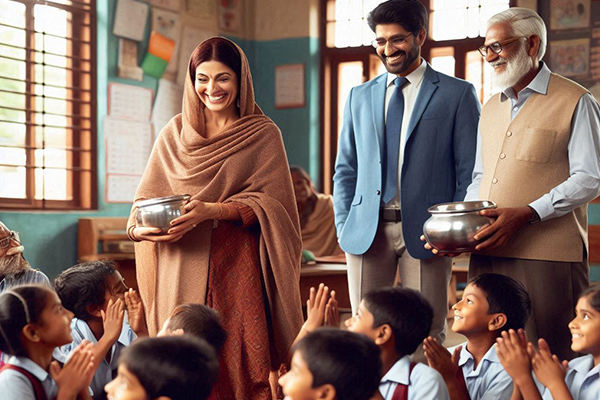
- Financial donations to temples, charitable organisations, or directly to those in need.
- Supporting the education of underprivileged children by donating to schools or educational charities.
Religious Items:
- Books on spirituality and religious scriptures.
- Items used in worship like incense sticks, diyas (lamps).
Shelter and Support:
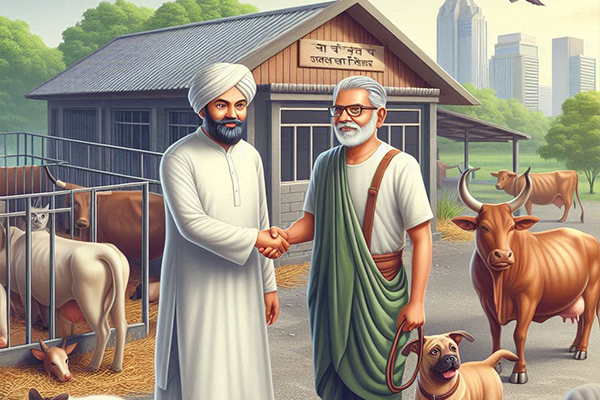
- Donating to shelters for the homeless or animal shelters.
- Contributing to the construction of schools, hospitals, and community centres.
Cows and Animal Care:
- Donating to goshala (cow shelters) or animal welfare organisations.
- Providing food & fodder and other essentials for animals.
.jpg)

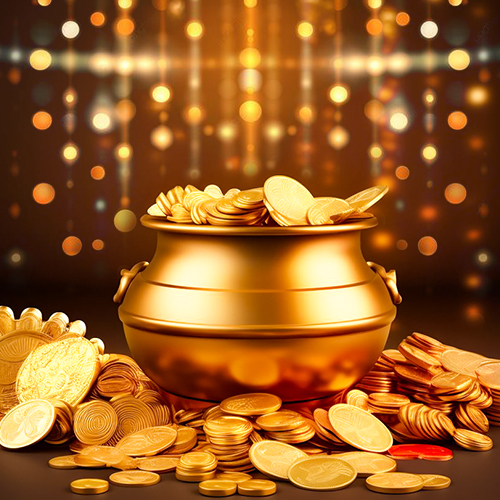
-in-Astrology.jpg)
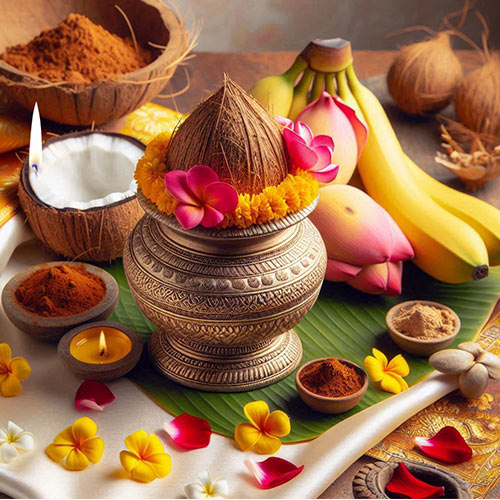
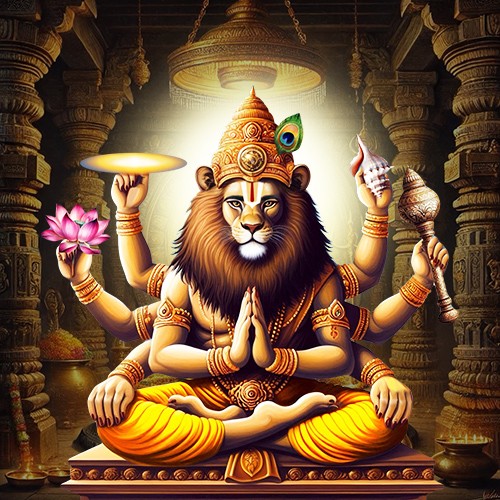
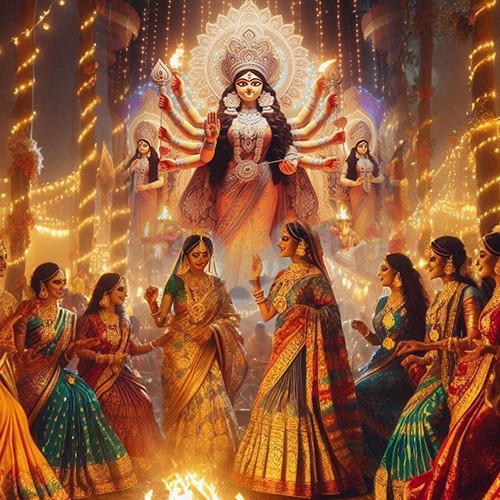
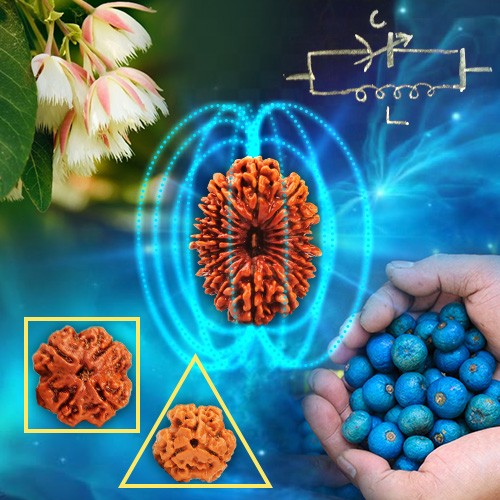

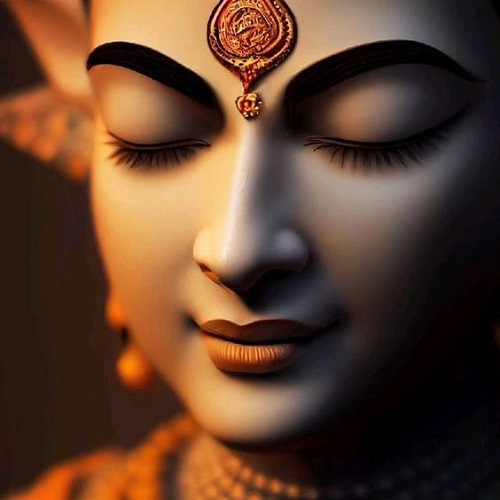
.jpg)
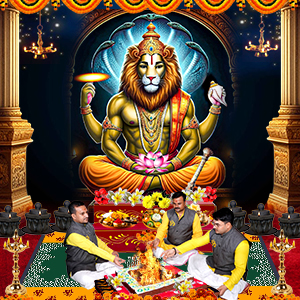
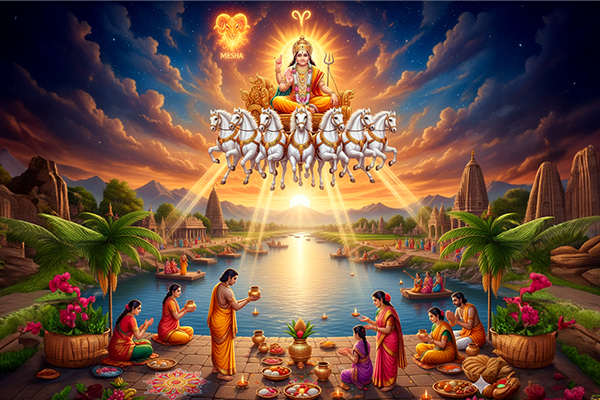
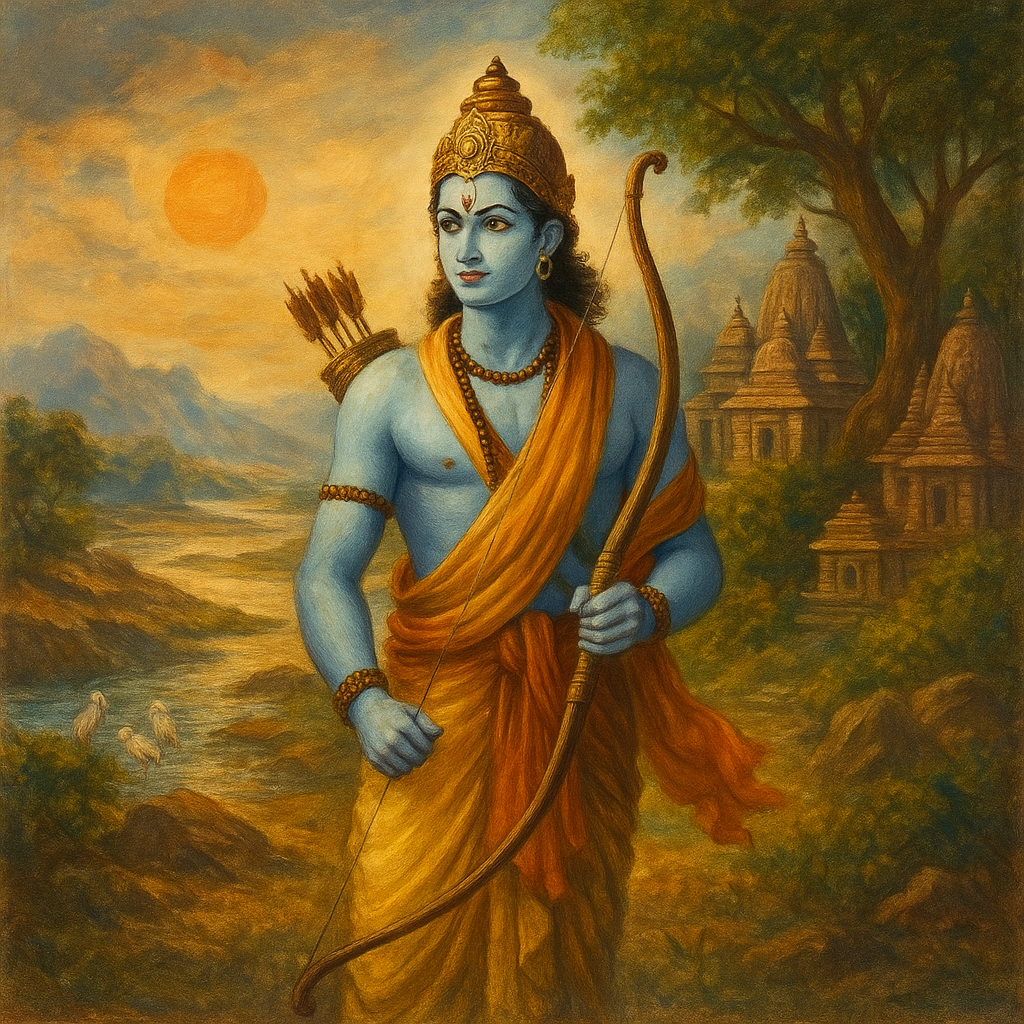
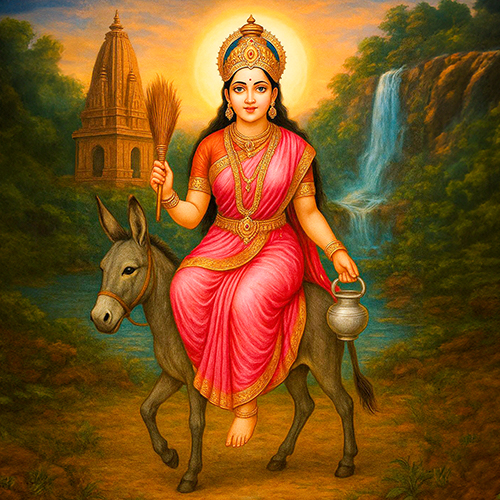
Comments 0
Leave your thought here